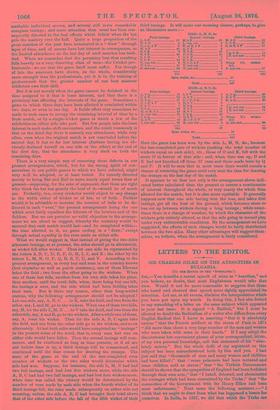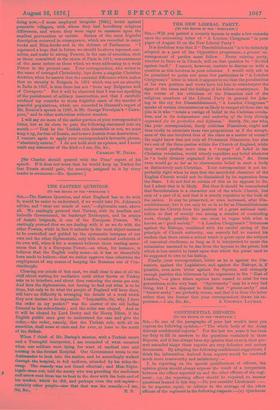LETTERS TO THE EDITOR.
SIR CHARLES DILKE ON THE ATROCITIES IN BULGARIA.
[TO TER EDITOR OF TER "SPECTATOR."]
S111,—You describe a recent speech of mine as " heartless," and you believe, no doubt, that most Englishmen would take that view. Would it not be more reasonable to suppose that those who heard and cheered that speech more rightly appreciated its intention. Let me, at all events, disclaim the interpretation which you have put upon my words. In doing this, I feel also forced to say something of a letter on the same subject which appeared in your last issue. It is signed "A Radical," but I must be allowed to doubt the Radicalism of a writer who differs from every English Radical that I know in asserting "that it is absolutely untrue" that the French soldiers at the storm of Paris in 1871 "did more than shoot a very large number of the men and women who were taken with arms in their bands." If I may adopt the discourteous but convenient phrase of your correspondent, let me, of my own personal knowledge, call this statement of his "abso- lutely untrue." But the whole drift of my argument on this subject has been misunderstood both by him and you. I had just said that "thousands of men and many women and children had been killed ;" that "some prisoners had been tortured and some children sold as slaves ;" that "the Turkish Government should be shown that the sympathies of England had been forfeited through their own acts ;" that "I hated, detested, and abominated the outrages which had been committed by the Turks ;" that "the connection of the Government with Sir Henry Elliot had been most unfortunate." Next came the following sentence :—"I think that we ought to draw from what has happened a lesson for ourselves. In India, in 1857, we did that which the Turks are
doing now,—I mean employed irregular [Sikh] levies against peaceable villagers, with whom they had hereditary religious differences, and whom they were eager to massacre upon the smallest provocation or excuse. Scenes of the most frightful description occurred in consequence, which are recorded in many books and Blue-books and in the debates of Parliament. "I expressed a hope that in future we should be above reproach our- selves, and make to strong Powers, in the case of atrocities, such as those committed at the storm of Paris in 1871, remonstrances of the same nature as those which we were addressing to a weak Power in the present case. Your correspondent, who writes in the name of outraged Christianity, lays down a singular Christian doctrine, when he asserts that the essential difference which makes that an atrocity in Bulgaria in 1876 which was not an atrocity in India in 1857, is that there has not "been any Bulgarian well of Cawnpore." But it will be observed that I was not speaking of the punishment of military insurrection, and that I carefully confined my remarks to those frightful cases of the murder of peaceful populations, which are recorded in Hansard's report of Mr. Buxton's speech in 1858, in Mr. George Trevelyan's " Cawn- pore," and in other authorities without number.
I will say no more of the earlier portion of your correspondent's letter, but at its close he puts the following statement into my mouth :—" That be the Turkish rule detestable or not, we must keep it up, for fear of Russia, and to save Austria from destruction." I venture again to apply your correspondent's favourite phrase, "absolutely untrue." I do not hold such an opinion, and I never made any statement of the kind.—I am, Sir, &c.,
CHARLES W. MERE.
[Sir Charles should quarrel with the Times' report of his speech. If it does not mean that he would keep up Turkey for fear Russia should gain, the meaning assigned to it by every reader is erroneous.—En. Spectator.]



































 Previous page
Previous page